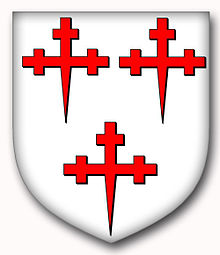John Adamson MA (1576–1653) was a Scottish minister and academic. Adamson was Principal of the University of Edinburgh from 1623 until his death in 1653.

Life
Adamson's father, Henry, who served as Provost of Perth, [1] [2] was an elder brother of Patrick Adamson, Archbishop of St Andrews.
Educated at Perth Grammar School, Adamson proceeded early to the University of St Andrews, where subsequently he held the professorial chair of philosophy. In 1597 he graduated with an MA from the University of Edinburgh and in 1598 he was made a "regent of philosophy", the equivalent of a modern Fellow, at the University. As a regent he would lecture to younger students. In 1604, having been presented to the church of North Berwick, he became minister of that parish. In March 1609, under patronage of King James VI, he was translated to the parish of Liberton, south of Edinburgh. [3]
In 1616, he sat on the Aberdeen General Assembly and was asked to draw up a liturgy and catechism specifically for children. [3]
In 1623, following Robert Boyd of Trochrig's resignation on grounds of ill-health, Adamson was appointed Principal of the University of Edinburgh, a post which he then held until his death in 1651. [3] He was succeeded by Robert Leighton, who did not take office until 1653 after outside interference with the original choice, William Colvill.
Family
In 1607 he married Marion Auchmoutie (d. 1651) daughter of Thomas Auchmoutie, an Edinburgh merchant. Their children were David Adamson (b. 1608) and Marie (b. 1611). [3]
Works
Adamson was a close friend of Andrew Melville, and it is believed that he collected the Latin poems of Andrew Melville, under the title Viri clarissimi A. Melvini Mvsae (1620). His own works include Dioptrae Gloriae Divinae (1637), a commentary on Psalm XIX, and Methodus Religionis Christianae (1637). His Traveller's Joy, to which is added The Ark (1623) are poetry.
He edited the Muses Welcome (1617); [4] it preserved speeches, theses and poems by himself and many contemporaries (among them Alexander Hume, David Hume, Drummond of Hawthornden, David Wedderburn, Robert Boyd, and David Primrose), and includes Drummond's 'Panegyricke to the King,' which contains his enumeration of the rivers of Scotland. Nichols's Progresses of James I preserves the speeches.
Notes
- ^ "Perth Magistrates". Scottish Family Heritage. Archived from the original on 21 March 2012.
- ^ "HISTORICAL BIOGRAPHIES - JJ HEATH-CALDWELL - JJHC". jjhc.info. Retrieved 20 July 2021.
- ^ a b c d Fasti Ecclesiae Scoticanae; by Hew Scott
- ^ Tὰ τῶν Μουσῶν Εἰσόδια. The Muses Welcome to the High and Mighty Prince Iames by the grace of God King of Great Britaine, France, and Ireland, Defender of the Faith, &c. At his Majestie's happie Returne to his olde and native Kingdome of Scotland, after 14 yeeres absence, in Anno 1617. Digested according to the order of his Majesties Progresse. By I. A.
External links
- Attribution
![]() This article incorporates text from a publication now in the
public domain: "
Adamson, John (d.1653)".
Dictionary of National Biography. London: Smith, Elder & Co. 1885–1900.
This article incorporates text from a publication now in the
public domain: "
Adamson, John (d.1653)".
Dictionary of National Biography. London: Smith, Elder & Co. 1885–1900.